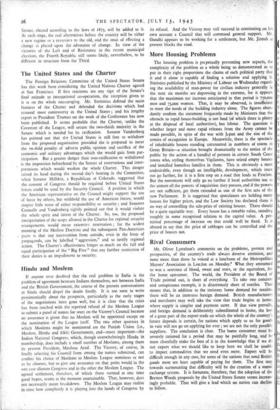The United States and the Charter
The Foreign Relations Committee of the United States Senate has this week been considering the United Nations Charter agreed at San Francisco. If first reactions are any sign of the Senate's final attitude to international co-operation, the reception given to it is on the whole encouraging. Mr. Stettinius defined the main features of the Charter and defended the decisions which had aroused most controversy in the United States ; and his lengthy report to President Truman on the work of the Conference has now been published. It seems probable that the Charter, unlike the Covenant of the League, will secure the two-thiids majority in the Senate which is needed for its ratification. Senator Vandenberg has pointed out that the United States is still free to withdraw from the proposed organisation provided she is prepared to incur the twofold penalty of adverse public opinion and sacrifice of the economic and military advantages which she would gain from par- ticipation. But a greater danger than non-ratification or withdrawal is the imposition beforehand by the Senate of reservations and inter- pretations which would weaken the whole Charter. This danger raised its head during the second day's hearing in the Committee, when Senator Millikin, a Republican of Colorado. suggested that the consent of Congress should be required before United States forces could he used by the Security Council. A position in which the American representative on the Council might support the use of force by others, but withhold the use of American forces, would inspire little sense of either responsibility or security ; and Senators Connally and Vandenberg rightly pointed out that it would violate the whole spirit and intent of the Charter. So, too, the proposed interpretation of the scope allowed in the Charter for regional security arrangements would mean extensive reservation ; for the widest meaning of the Moriroe Doctrine and the subsequent Pan-American pacts is that any intervention from outside, even in the form of propaganda, can be labelled " aggression," and so justify regional action. The Charter's effectiveness hinges so much on the full and equal participation of the " Big Five " that any further restriction of their duties is an impediment to security.


























 Previous page
Previous page